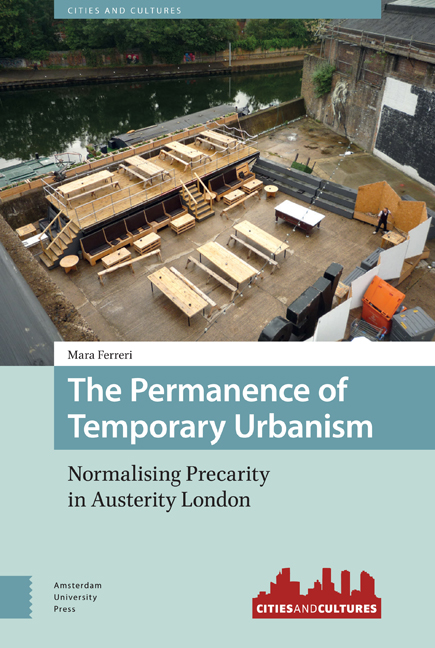2 - The Entangled Field of Temporary Urbanism
Published online by Cambridge University Press: 13 April 2021
Summary
Abstract
The chapter analyses the emergence of pop-up and temporary urbanism in the UK after the 2008 global financial crisis as an entangled field made of competing narratives and representations. Media coverage, public events and self-representation are discussed to outline how official and unofficial narratives are constructed, mobilised and performed. Focusing on London, it presents a critical cultural discussion of transfers and translations between central and local government officers, property investors and estate agents, and third-sector ‘meanwhile space’ intermediaries. Temporary urbanism at times of post-crisis austerity is confirmed as an ambiguous urban cultural discourse that raises the promise of practices of dissent and vacant space re-appropriation, such as community-oriented radical practices and squatting, while practically foreclosing them.
Keywords: representation, urban policy, squatting, community-oriented, pop-up spaces, London
The emergence of a discourse
On the surface, the central assumption shared by all proponents of temporary urbanism is that it is better to use vacant spaces such as empty shops, even if temporarily, than to let them lay empty. This seductive proposition is only apparently straightforward: to the immersed observer, the discourse of temporary urbanism has emerged through time- and space-specific translations of multiple and at times contradictory and contested rationales and value judgements. Approaching the emergence of the discourse of temporary urbanism requires understanding how assumptions and arguments are mobilised through competing position-takings and cross-pollination across a range of urban practices from architecture to visual and performative art to marketing and urban design. It is important to note, following Bourdieu, that the ‘field of position-takings’ of temporary urbanism does not arise from an overarching coherence in the position of participants or from an underlying consensus: the field is itself ‘the product and prize of a permanent conflict’ over the production of meanings, and participation in this struggle becomes the main criterion for belonging to the field. I approach the discourse of temporary urbanism as relationally constituted through processes of establishing semi-stable meanings and narratives, which are contingent and produced through time- and space-specific power relations, both in the creation of discursive formations and in the struggle between them.
- Type
- Chapter
- Information
- The Permanence of Temporary UrbanismNormalising Precarity in Austerity London, pp. 29 - 56Publisher: Amsterdam University PressPrint publication year: 2021



